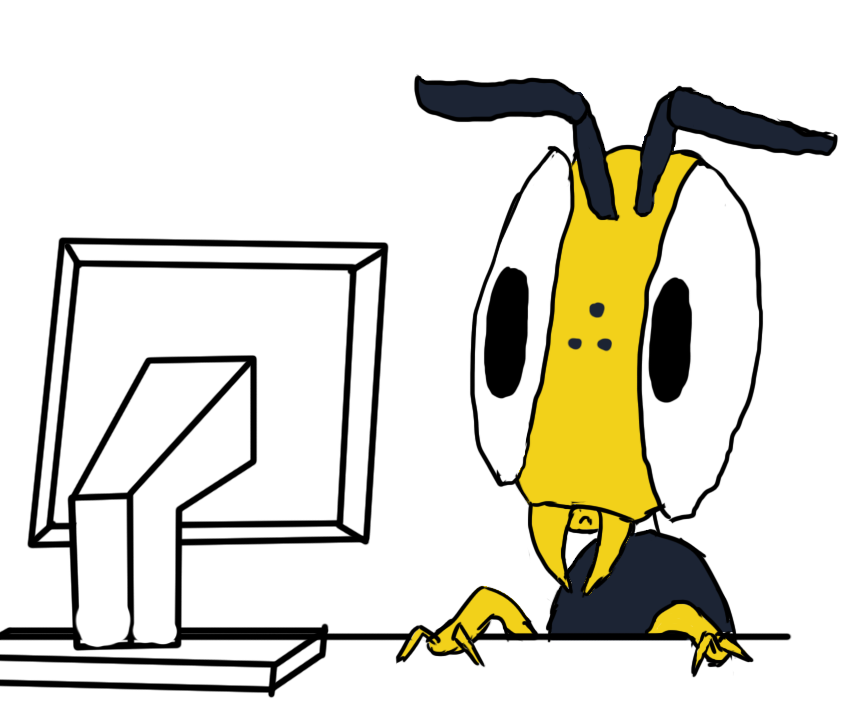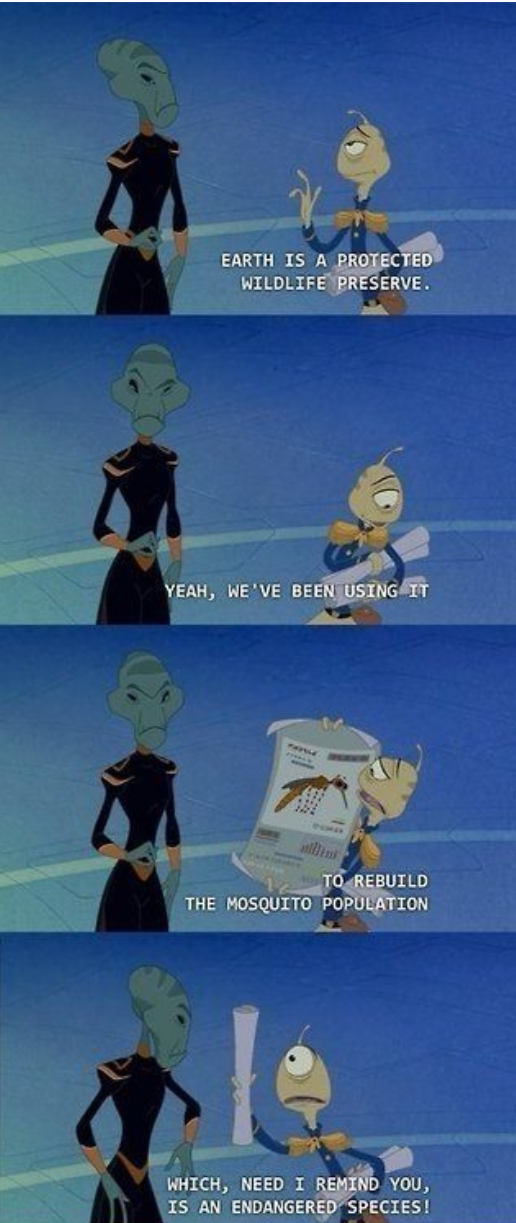Kill them with fire!
solarpunk memes
For when you need a laugh!
The definition of a "meme" here is intentionally pretty loose. Images, screenshots, and the like are welcome!
But, keep it lighthearted and/or within our server's ideals.
Posts and comments that are hateful, trolling, inciting, and/or overly negative will be removed at the moderators' discretion.
Please follow all slrpnk.net rules and community guidelines
Have fun!
What about ticks?
I'm torn by spider wasps. I get irrationally angry when I see one of my wolf spider buddies getting dragged across the yard to their death.
Shitty wasps like Yellow Jackets give almost all the other wasps a bad reputation. Yellow Jackets are mean and spiteful, even when they aren't protecting their nest.
Most other eusocial wasps are pretty docile, unless you mess with their nest or really go out of your way to harass them.
In many parts of the world, like my own, there are far more species of solitary wasps than eusocial wasps. Solitary wasps are nearly all non-aggressive, they don't have communal nests to defend, and they basically don't have time to fuck around with stinging shit because they are too busy building a chamber for their eggs, collecting food for their upcoming progeny, and trying to stay fed and hydrated while doing it.
So what I'm getting at is that most wasps I encounter on a regular basis are pretty chill. Really, this goes for bees as well. Most of the ones I see on a regular basis are solitary types and non-aggressive. The most aggressive bees I tend to encounter are male carpenter bees. They are highly territorial and they'll even buzz a human to scare them off. However, there's no threat. Male bees and wasps cannot sting, they do not even have stingers.
The most aggressive bees I tend to encounter are male carpenter bees. They are highly territorial and they'll even buzz a human to scare them off. However, there's no threat.
No threat of stinging, anyway. They will absolutely wreak havoc on a wood framed house.
bzzzzbzzzBZZZZZ
Yes, sir, I see you. I see your little pile of sawdust on the fence, too. No, I'm not going to screw with it. I'm just installing this gate latch."
bzzzbzbbzbbzbzbzbzbzzzzz
This would go a lot faster if I didn't have to keep ducking.
BZZZZZZ
Okay, I'm done, jeez.
BZZZZZzzzbzzzz^bzzzz^
...aaaaand under the fascia board it goes. Shit.
Ok, fine, educate me, what do wasps contribute to the environment?
Many wasp species, while not considered pollinators, still transport pollen and pollinate plants. Others hunt pest insects. There are also many species that are vital as prey for birds
They eat the things that eat the things you eat.
(e.g. aphids, caterpillars and mfcking thrips and leaf miners)
PS: ok just one more: if bees are the plant matchmakers, wasps are broad spectrum pest exterminators.
Yeah… well the also eat my peaches and plums. So they eat my food, and that just ain’t cool. On top of that they set up shop by my front door and then sting me for just walking into MY house where I was letting them make a little room of their own. Not no more. Them bitchass mfers are back in hell where they belong, and my world is much better since I opened that portal for them.
People who post shit like this are being intentionally obtuse and provocative. "Wasp" is a big tent classification, and what everyone else thinks of are a few specific creatures.
A wasp is any insect of the narrow-waisted suborder Apocrita of the order Hymenoptera which is neither a bee nor an ant;
Vast majority of things that are "wasps" don't bite/sting and many are important pollinators.
The bitey stingy ones? Fuck em.
You lost me at the end. Now you're the one being obtuse and provocative. Just because something stings or bites doesn't mean it isn't good for the environment.
I know they're important. I'm also afraid of them because some members of my family have had adverse reactions to stings from wasps. I would like wasps to live happy, happy lives far, far away from me.
OP:

Credits to LittleFuzzyWasp
Everyone thank OP for pollinating!
He's a fucking wasp, he pollinates nothing but rot and death and misery.
Pest control guy killed the wasps on my balcony without asking :/ I don't even use the balcony, they were just chillin. Now theres just a pile of corpses
I stopped being scared of wasps after learning how to read their body language. Quiet buzzing and relaxed wings = calm, whereas loud buzzing and raised wings = mad. Plus, as long as you're not allergic, a sting is just temporary pain, which definitely isn't worth taking their life. Wasps are literally just animals, and we should be kind to them.
I haven't killed a wasp in years. And that was only because it was building a nest inside my storm door just above eye level. Surprised the shit out of me because I barely saw the nest in the dark, struggled to change focus, and jumped back once I realized what I was seeing. Was not a fun encounter. It's like, buddy, nobody was gonna be happy with that arrangement.
Blue-eyed ensign wasps are cute :3
Had one indoors the other day at work and someone noticed it and was bothered by its existence. I took a picture of it and the grabbed it to take it outside. Would have preferred to let it be, but worried others might hurt it :\
More wasp propaganda. Nature does not owe me safety. My house siding is NOT NATURE. I WILL REVEL IN THEIR DEATH THROES.
yeah, nature does not owe you safety, which is why i kill wasps on sight because I'm part of nature. get fucked, wasps, we all know you're just fascist bees.
I will not stand for this Pro wasp propaganda!
Bees, wasps, ok, got it.
But mosquitoes? I'be yet to find a biologist that would advocate for preservation of mosquitos. Kill them with fire.
Bees are like carpenters, they carry a knife but you're not worried they might stab you for no reason.
Wasps are like meth heads.
They're like meth head gang members that also call their gang to attack you after they do. That's what terrifies me of them.
Of course nature doesn't owe us safety. That's why it's up to us to ensure our own safety by killing it with fire.
listen, i didn't ask to be born with a functional aversion to isopods and insects in general, ok.
I didn't want this shit, but i got it anyway.
Is there a bee-ologist who can tell me if hornets are wasps, or are they their own thing?
The wasps around here have always been pretty chill around me, but I get wary around hornets.
So, first of all a bee-ologist can only help you marginally, as bees are in the same order as wasps, hornets and ants but relatively far removed from them. Hornets (genus vespa) and classic wasps (genus vespula) on the other hand share the same subfamily vespinae and are both considered wasps. This was a nice short dive into wikipedia. As I am a crystallographer any real entomologist can feel free to correct me.
Stupid question.
Could a wasp be bred/altered to not have a sting, or at best not have a sting that can penetrate human skin? It's akin to domestication, but we selectively breed wasps to not be such cunts.
I feel like humans are the only species whose extinction would not have a negative effect on Earth's ecosystem (quite possibly a positive one)
Fun fact: I've been doing a lot of reading about indigenous peoples, and one of the constant themes is how those peoples' traditional life ways were net positives for the environment. In California, for instance, Native American agriculture involved controlled burns every twenty years or so - keeping the soil fertile and encouraging a healthy mix of the "wild" species they cared for. They had been doing that for maybe 20,000 years. So when "environmentalists" in the early 20th century decided native lifeways were primitive and bad for the environment, and established enormous national parks where natives were no longer permitted to hunt or gather and fires were stamped out immediately, those national parks turned into tinder boxes - instead of the controlled burns the plants had evolved to take advantage of, we ended up with decades of fuel building up in the undergrowth, turning into massive uncontrolled burns that killed everything, and then invasive species rolled up and finished off the native plants.
"But untouched pristine wilderness"... No. That never existed. That's a racist trope spread by white colonists who wanted to think of Native Americans as enemies of nature in order to justify genocide. It's the opposite of the noble savage myth and equally racist. Fuck John Muir.
Over and over again, when you compare areas where indigenous people had lived in their traditional lifeways to areas where the people were killed or exiled but the environment was left untouched, the areas where humans were genocided have less species diversity, less fertility, and less healthy environments overall.
And if we, 21st century humanity, can use our science and technology to rediscover the old knowledge, we can take up our previous role and manage the environment around us for the benefit of all. Hell, in a lot of environments we have a duty to do so - we brought the rabbits to Australia, who's going to get rid of them if not for us?
And all that rant is to say, humans aren't the problem. Capitalism is the problem. Greed is the problem. Humans have lived as beneficial parts of the environment for approximately 150,000 years and we can do so again.
Aedes mosquitos serve no known ecological purpose. They are purely parasitic, are not unique pollinators (as in, any plant they do pollinate is also pollinated by other species), and do not make up a substantial portion of the diet of any species.
I would venture to say their extinction would have a positive effect on the Ecosystem by closing that transmission vector for the diseases they carry.

